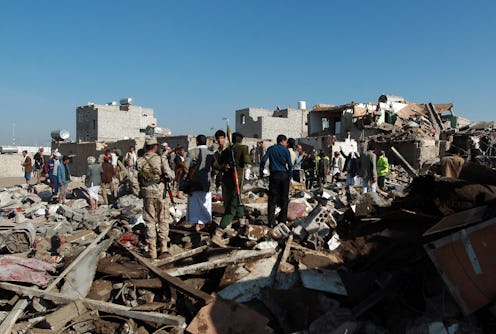News
U.N. Says Yemen's "Total Collapse" Is Likely
Ambulances in Yemen aren't just used to haul injured civilians to the emergency room anymore — they're used primarily for transporting the dead. Since fighting between Iranian-friendly Shiite Houthi rebels and supporters of exiled President Abdo Rabu Mansour Hadi began to escalate back in September 2014 (culminating with Hadi's ousting in January of this year), The New York Times reported that the situation for Yemeni citizens has gone from bad to worse — with no end in sight. Things have become so bad in fact that on Tuesday, the U.N. reported that Yemen's "total collapse" was likely unless the two groups agreed to a sit-down in order to resolve their differences using dialogue rather than continued, ineffective force.
"The situation in Yemen is extremely alarming, with dozens of civilians killed over the past four days," said UN High Commissioner for Human Rights Zeid Ra’ad Al Hussein in a statement. "The country seems to be on the verge of total collapse." Al Hussein also expressed concern with a rising number of human rights violations, strongly condemning any and all attacks on civilian populated areas.
According to Tuesday's U.N. report, fighting has caused some 93 fatalities and injured an additional 364 injuries in Sanaá, Sa'da, Dhale, Hudayda and Lahj, although that number is expected to rise if civilian centers continue to be targeted, something that Al Hussein called "simply unacceptable."
Most concerning, Al Hussein pointed out, was the targeting of hospitals and refugee camps, which have very little in the way of self defense or security.
"I am shocked by Monday’s airstrike against the Al-Mazraq camp for internally displaced people in Harad, in the north of Yemen," he said, speaking on the horrific attack that killed 19 and injured 35, including 11 children. According to U.N. reports, both the Yemeni Army's 33rd armored division and Houthi rebels also laid siege to three hospitals in the Dhale district.
"Private homes, hospitals, education facilities and infrastructure in several locations have been destroyed, making life even more difficult for the people in this war-torn country," lamented Al Hussein. "The principles of proportionality, distinction, and precaution fully apply in this context — international human rights law and humanitarian law should be fully respected."
Since President Hadi's forced exile on January 22, the outside world has watched in horror as Yemen literally crumbles under vicious shelling and hails of gunfire on a daily basis. One Health Ministry official told The New York Times that the run-down coastal city of Aden has essentially become a bed of rubble and darkened hallways, rife with the stench of death. "[The situation in Aden] is miserable," said Al-Khadher Laswar in a comment, indicating that doctors and health officials had been completely overwhelmed with rising numbers of victims. And with supplies dwindling rapidly, there's little hope for self-rescue.
Jack A. Goldstone, fellow at the International Center for Scholars and Hazel Professor of Public Policy at George Mason University, suggested in a recent op-ed that there was little the Western world could do at this point, short of dropping an influx of troops on the ground, but sit back and wait until more moderate powers began to gain the upper hand. In this case, he explained, outside forces would be able to fully prop up and support the rising powers. If needed, the West would "contain any dangerous jihadist elements" that rise from the ashes. But either way, he suggests, "it is a war that the West loses no matter who wins."
CNN reported Tuesday that a Saudi-led coalition of nine separate countries began escalating airstrikes against the Houthi rebels, with Saudi military forces making their way to the shared border with Yemen. Pakistani Prime Minister Nawaz Sharif and fellow government officials also pledged the country's support and commitment to resolving the situation in Yemen.
"Pakistan stands committed to playing a meaningful role in arresting the deteriorating situation in the Middle East," said officials in a statement on Monday.
While U.S. forces are not directly involved in the conflict, officials reported that they were assisting the Arab coalition with logistics and planning when possible. Newly re-elected Israeli Prime Minister Benjamin Netanyahu has also cast his voice in the battle, accusing Houthi-backed Iranian officials of attempting to manipulate the situation in Yemen in order to "take over the whole Middle East."
Until Yemeni military forces and the Arab coalition are able to gather enough resources and firepower, civilian casualties will continue to rise in one of the bloodiest clashes the region has seen in a while. And though exiled, President Hadi wielded what power he had left to threaten the aggressive Houthi campaign.
"You violated the sovereignty (of Yemen)," he said in a statement. "You bear the responsibility for what happened and what is going to happen."
Images: Getty Images (2)
